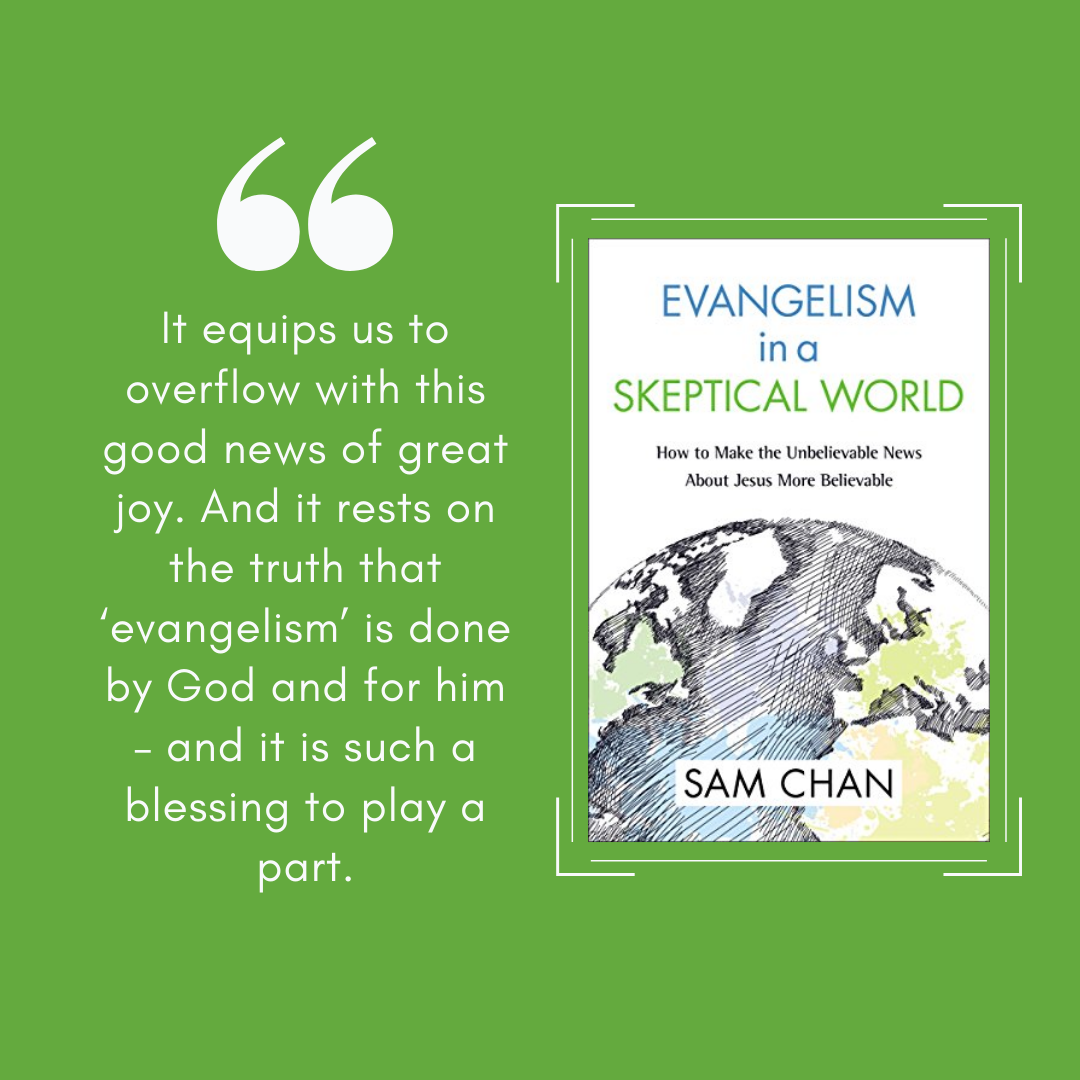
Sam Chan’s ‘Evangelism in a Skeptical World’ describes itself as explaining ‘How to Make the Unbelievable News about Jesus More Believable’ – an evangelism manual, if you like. But please, don’t switch off yet! For whilst this book practically and intellectually equips readers with knowledge of the theory and practice of evangelism, it also provides immense encouragement and confidence. Sam helpfully gives practical pointers about how we might capture today’s world with the wonderful beauty of the gospel – and as he did so, I too was struck again by the true balm that knowing Jesus is to our souls.
If you’re anything like me, calling yourself an ‘evangelical Christian’ is rarely a simple process. In fact, it might seem to you unlikely, perhaps even unimaginable, to identify yourself as an evangelical and simply leave it there. Like me, you may be all too familiar with the grimace in your conversation partner’s face, as if the expression itself leaves a lingering odour in the air. Maybe you hurry to explain away the frown, heavy with the stigma that weighs down the word – or maybe you are simply stuck, silenced by your own feelings of inadequacy. Certainly, ‘evangelism’ is not word in common use in society. When it is used, it feels tainted, tinged by the preconceptions of non-believers, as well as our own. What even is evangelism? Why do we evangelise? And how on earth are we supposed to do it?
This is where Sam’s book steps in. Throughout the book, he carefully unpacks the theology of evangelism, before piecing together what that means in practice. From the start, Sam both challenges and encourages: evangelism is not defined by medium, method, occasion, nor audience – but rather ‘the essence of evangelism is defined by its message, the gospel of Jesus Christ’ (p.16). And we see that in Jesus, as he frequently used metaphors to refer to various aspects of the gospel. To Nicodemus, a Pharisee, Jesus says ‘You must be born again’ (John 3:7); to a Samaritan woman at a well, Jesus says ‘Whoever drinks the water I give them will never thirst’ (John 4:14); to a man born blind, Jesus says ‘I am the light of the world (John 9:5). Alongside these illustrations, in the Bible there are various presentations of the gospel that are not limited to a three-point sermon – or even ‘Two Ways to Live’! For example, the apostles shift their gospel presentation to include the Old Testament depending on their audience’s background as Gentile or Jewish (compare, for instance, Acts 4:10-12 and Acts 14:15-17). Sam’s deconstruction of why and how we evangelise using examples from the Bible was genuinely mind-opening, as there are just so many biblical ways that we can describe the gospel – a truth that is comforting when our explanation of what we believe feels perpetually stale or incomplete.
A particularly helpful feature of this book is the insightful cultural understanding it displays. Sam takes us through different schools of thought, creatively and accessibly explaining the increasingly predominant ideas encapsulated in post-modernism (such as rejecting absolute truth), whilst highlighting the cross-cultural nature of the gospel – a point of which he has personal awareness, as an Asian-Australian who has spent a lot of time in America. The gospel really is the answer to the questions of humankind throughout history! Sam intersperses hypothetical examples, real-life stories, academic commentary, and practical advice, for evangelism in both conversations and events and talks. Especially as someone who has grown up in the church, I can find it difficult to authentically empathise and understand the worldview of my friends. This book guides us in doing this better. It provides useful ideas for talk topics, testimony structures, friendship tips, metaphors for the elements of the gospel, and responses to tricky questions, critiquing and suggesting methods of explaining the gospel along the way.
As someone who (regrettably) rarely finishes a Christian book, I can honestly recommend this one. For those who feel dry in their evangelism, or those who don’t know where to start, for leaders, for friends, for the cautious, for the weary, for those whose feelings of incapability sometimes overwhelm their desire to speak about Jesus: this book is both dynamic and truly refreshing. It provides confidence when we doubt that the gospel is the power of God that brings salvation. It equips us to overflow with this good news of great joy. And it rests on the truth that ‘evangelism’ is done by God and for him – and it is such a blessing to play a part.
- Dorothy Burrowes
Dorothy Burrowes, 26/03/2021